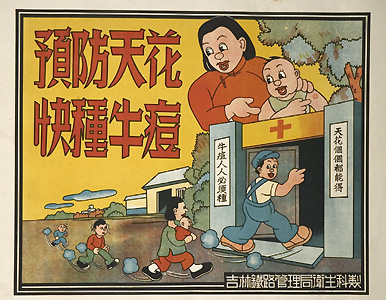"The collection has a wide range of media presentations: posters, health newsletters, health newspapers, paintings, pharmaceutical advertisements, calendars, children's chess games, jigsaw puzzles on health topics, playing cards on SARS, lantern slides, negatives, photographs, and health award certificates, as well as books and journals. These materials present rich visual representations of public health concerns which were closely tied to the political, social, economic, and even military engagements of China during different time periods."Here are a few of the images:
 "Properly cover yourself with bedding during sleep, ca. 1935."
"Properly cover yourself with bedding during sleep, ca. 1935."Check out the rest of it at: Chinese Public Health Posters

